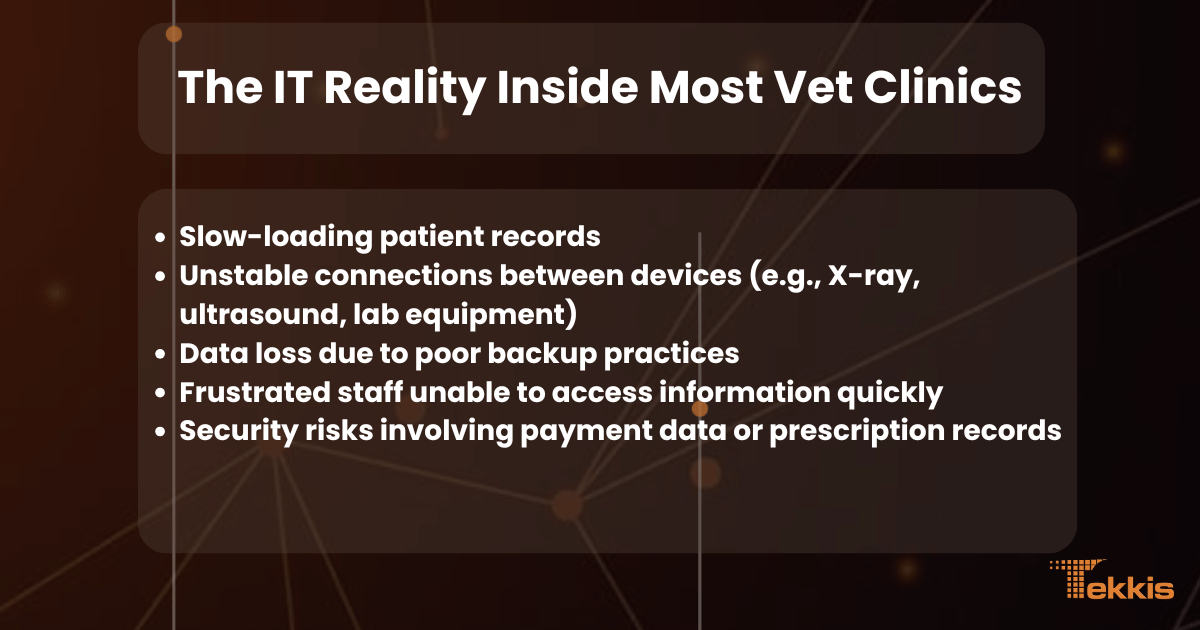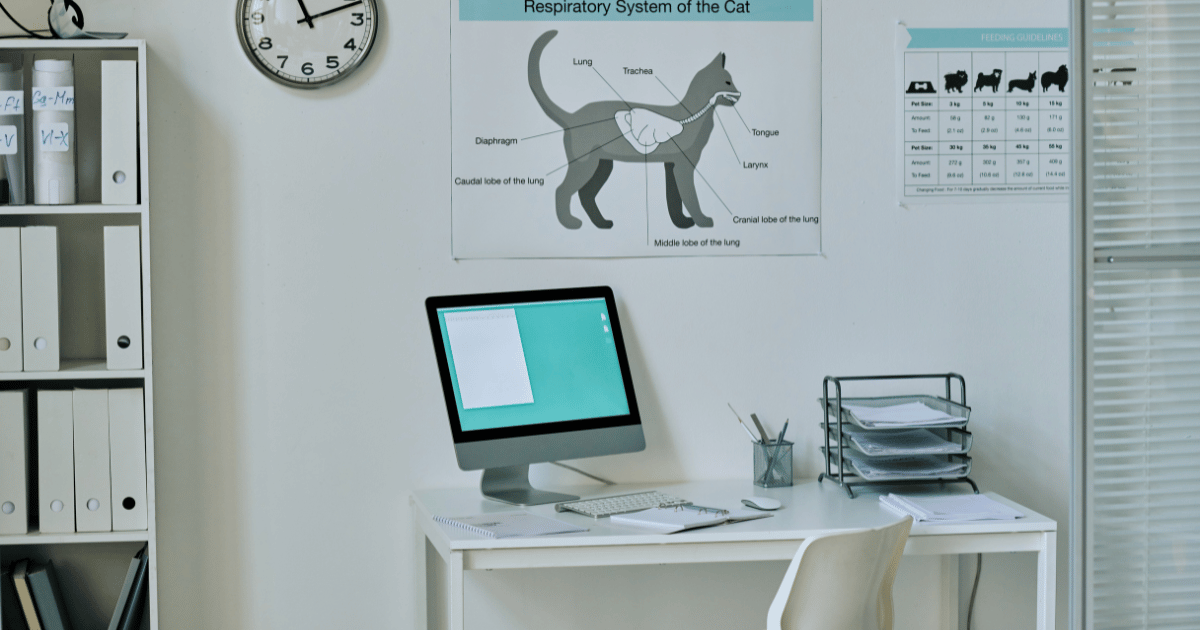Why Your Clinic's IT Strategy Matters More Than Ever
As the demand for quality veterinary care rises across the U.S., clinics and animal hospitals are under growing pressure to deliver fast, accurate, and compassionate service without getting tripped up by slow systems, outdated software, or security risks. In veterinary practices, where every second can make a difference in diagnosis or treatment, IT performance isn't a luxury, it's a necessity.
While industries like energy and infrastructure have already shifted toward smarter, tech-integrated operations TAQ Energy, veterinary offices are just beginning to recognize the value of investing in reliable, secure, and streamlined IT solutions built for their unique clinical environments.
In this article, we explore what Veterinary Office Computer Solutions should include, common tech challenges faced by animal care providers, and how to build a system that enhances rather than hinders care delivery.
The IT Reality Inside Most Vet Clinics
Unlike large hospitals with dedicated tech departments, veterinary practices often rely on a patchwork of software, hardware, and part-time IT support. This leads to:

- Slow-loading patient records
- Unstable connections between devices (e.g., X-ray, ultrasound, lab equipment)
- Data loss due to poor backup practices
- Frustrated staff unable to access information quickly
- Security risks involving payment data or prescription records
These inefficiencies don't just cause internal friction they also impact patient care, client satisfaction, and the ability to grow or scale.
What Veterinary Office Computer Solutions Should Actually Include
A true veterinary IT solution isn’t just about fixing broken hardware. It’s about building a digital foundation that supports both clinical and operational excellence. Here’s what that should look like:
1. Integrated Practice Management Software (PMS)
Veterinary PMS tools like AVImark, Cornerstone, eVetPractice, or Hippo Manager need to run smoothly across all workstations front desk, exam rooms, labs, and surgical areas.
Reliable computer systems must support:
- Real-time patient charting and medical history access
- Automated appointment scheduling and reminders
- Integrated billing and inventory tracking
- Secure client communication portals
A lagging or incompatible PMS can disrupt every workflow in the clinic.
2. Seamless Device Connectivity
Vet practices often rely on a range of specialized equipment, including:
- Digital radiography (DR) systems
- Ultrasound imaging
- Blood analyzers
- Microscopes with digital output
These devices must connect to your central network without delays, conflicts, or driver errors. Solutions should ensure:
- High-speed local network (wired or wireless)
- Proper configuration of each diagnostic machine
- Ongoing compatibility checks after software updates
3. HIPAA-Like Data Privacy Standards
While HIPAA doesn’t directly apply to animal patients, pet owners still expect (and deserve) confidentiality, professionalism, and secure handling of personal and payment data.
Veterinary offices should implement:
- Role-based access to sensitive records
- Data encryption (at rest and in transit)
- Secure payment terminals and PCI-compliant processing
- Enforced login/logout procedures to prevent unauthorized access
4. Automated, Verifiable Backups
Losing patient records or diagnostic images due to system failure can damage both clinic operations and client trust. Every veterinary office should have:
- Daily automated backups to both local and cloud storage
- Backup verification reports to confirm data integrity
- A clear disaster recovery plan with defined timelines
If a server goes down or ransomware strikes, you need to recover within hours not days.
5. Cybersecurity Protection Tailored to Veterinary Workflows
Veterinary clinics often have vulnerabilities because staff wear multiple hats and may not have time for in-depth cybersecurity training.
An effective IT solution includes:
- Antivirus and firewall protection on all endpoints
- Email filtering to catch phishing attempts
- Automatic system updates to patch known risks
- Onboarding and training materials for staff on best practices
Common Tech Pain Points in Veterinary Practices
Veterinary environments are fast-paced and emotionally intense. Technology should help not hinder that mission. But too often, clinics run into:
| Problem | Root Cause | Impact |
| Slow workstations | Aging hardware or bloated software | Appointment delays |
| Lost appointment data | No central database or sync issues | Missed visits, unhappy clients |
| Staff confusion on software use | Lack of training | Errors in billing or charting |
| Lack of file access between rooms | Poor network setup | Inefficient communication |
| Data loss after power outage | No backups or UPS | Permanent record loss |
These issues are preventable with the right systems in place and a proactive support model.
Why Local Matters: The Value of On-the-Ground IT Support
Veterinary practices, especially in Colorado or other semi-rural states, benefit from local IT providers who understand the infrastructure challenges, internet limitations, and urgency of on-site support.

Benefits of local IT partnerships include:
- Faster service for urgent fixes
- On-site assessments to improve device layout and connectivity
- Tailored solutions based on real patient volume and clinic layout
- Fewer delays when new equipment or software is installed
Remote-only tech support rarely meets the needs of busy veterinary teams who need answers in real time especially when treating critical cases or working on tight appointment windows.
Aligning IT with Veterinary Workflow
Veterinary medicine involves a distinct flow of people, pets, and information. The best computer solutions are designed to align with how your clinic operates, including:

- Mobile carts or tablets for exam rooms
- Print stations for prescriptions and lab results
- Voice dictation software integration
- Remote access for emergency call-ins or after-hours notes
Your IT provider should walk through your clinic's workflows not just your software stack to make sure every component supports, rather than disrupts, care delivery.
Questions to Ask When Evaluating Veterinary IT Partners
Not all IT providers understand veterinary-specific needs. Before hiring someone to manage your clinic's systems, ask:
- Do you have experience with veterinary software and imaging tools?
- Can you help us set up secure, automated backups and recovery plans?
- Will you provide both remote and on-site support?
- Do you offer cybersecurity monitoring tailored to small medical environments?
- Can you assist with network planning and equipment upgrades?
A good partner will proactively manage your IT not just fix things when they break.

Final Thoughts: Don’t Let IT Undermine Patient Care
In veterinary medicine, every detail matters from how quickly you can retrieve a radiograph to how smoothly you can check out a patient. When your computer systems slow you down, they don’t just impact your efficiency, they impact trust, reputation, and your ability to focus on what matters: the animals.
By investing in dependable, secure, and customized Veterinary Office Computer Solutions, your practice can operate at full strength without the tech frustrations. And as other industries like energy have already shown, the smarter your systems, the more resilient your operations become.
To learn how a strategic IT foundation can benefit your clinic, visit TAQ Energy and discover how technology is transforming operational efficiency across sectors.



